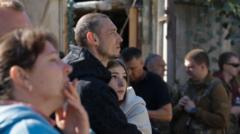Is Kyiv Mourning After Strikes While Allies Debate Military Support?

Published: 2025-08-29 08:56:09 | Category: technology
The recent aerial attack in Kyiv marks a devastating escalation in the ongoing conflict, resulting in the deaths of at least 23 individuals, including four children. This tragedy has prompted a day of mourning in the city, as recovery efforts continue amidst widespread condemnation from global leaders. The attack highlights the urgent need for military support and diplomatic solutions to the crisis in Ukraine.
Last updated: 15 October 2023 (BST)
Key Takeaways
- At least 23 people, including four children, have been killed in a major aerial attack in Kyiv.
- The attack has prompted a day of mourning, as recovery efforts continue at the site of destruction.
- International leaders have condemned the attack, emphasising the urgent need for military support for Ukraine.
- Discussions regarding peace negotiations appear increasingly unlikely amidst ongoing hostilities.
- EU defence ministers are convening to discuss military support for Ukraine, highlighting the urgency of the situation.
Context of the Aerial Attack
The attack that took place on Thursday night is reported to be the second largest aerial assault on Kyiv since the onset of the war. It has left the city reeling, with significant loss of life and property. Among the casualties, 22 individuals were killed in a five-storey residential block, further exacerbating the humanitarian crisis in the region.
Immediate Aftermath and Response
In the wake of this tragedy, Kyiv's mayor, Vitali Klitschko, announced a day of mourning to honour those who lost their lives. Recovery operations are ongoing, with emergency services working tirelessly to locate any survivors and assist those affected. The attack not only resulted in civilian casualties but also damaged significant buildings, including the EU's diplomatic mission and the British Council building, underscoring the far-reaching impacts of the conflict.
International Reaction and Condemnation
The attack has drawn strong condemnation from various international leaders. The White House has expressed dismay, with President Donald Trump reportedly "not happy" about the situation but not surprised, indicating a level of predictability in the ongoing violence. Ursula von der Leyen, President of the European Commission, stated that Russia appears intent on terrorising Ukraine, a sentiment echoed by many in the international community.
Military Support for Ukraine: A Critical Discussion
In response to the escalating violence, EU defence ministers are convening in Copenhagen to discuss military support for Ukraine. The importance of these discussions cannot be understated, as the conflict continues to evolve with each passing day. Defence Minister Dovilė Šakalienė of Lithuania highlighted that Russian President Vladimir Putin's actions suggest a deliberate strategy to prolong the war, making any hopes for peace negotiations appear increasingly naïve.
Calls for NATO Membership
Estonia's Defence Minister Hanno Pevkur has suggested that the best security guarantee for Ukraine would be membership in NATO. This perspective reflects a growing consensus among some European nations that a stronger military alliance may provide the necessary deterrent against Russia's aggressive tactics. However, the path to NATO membership is complex and fraught with challenges.
Continued Hostilities and Broader Implications
Despite a brief period of reduced fighting following the attack, both Russia and Ukraine have reported shooting down numerous drones in the ongoing conflict. In Kharkiv, regional head Oleh Syniehubov confirmed that five settlements had been attacked, resulting in further casualties, including one death in Kupyansk. These developments indicate that the situation remains volatile, with no immediate end in sight.
The Stalled Peace Efforts
Former President Trump's attempts to organise a summit between Ukrainian President Volodymyr Zelensky and Putin have reportedly stalled. Following the recent attack, Zelensky reiterated that Moscow has opted for "ballistics instead of the negotiating table," highlighting the challenges of initiating any meaningful dialogue. The German Chancellor Friedrich Merz also echoed this sentiment, suggesting that a meeting between the two leaders is now unlikely.
What Happens Next?
As the conflict in Ukraine continues to escalate, the international community faces pressing questions about the future of military support and potential pathways to peace. The situation is complicated by the ongoing violence and the apparent unwillingness of Russia to engage in diplomatic talks. Observers are left to consider the implications of these developments on regional stability and global security.
The Humanitarian Crisis
The humanitarian crisis in Ukraine is deepening as civilian casualties mount and infrastructure is increasingly targeted. The international community must grapple with the urgent need for humanitarian aid, while also considering military support to counteract Russian aggression. The balance between providing immediate assistance and seeking long-term solutions will be crucial in the coming months.
FAQs
What triggered the recent aerial attack in Kyiv?
The recent aerial attack in Kyiv was reportedly part of a broader strategy by Russia to escalate military actions against Ukraine, resulting in significant civilian casualties and damage to infrastructure.
How has the international community reacted to the attack?
International leaders have condemned the attack, with calls for increased military support for Ukraine and urgent discussions among EU defence ministers regarding the situation.
What are the implications for peace negotiations?
Recent events suggest that hopes for peace negotiations are diminishing, as leaders express concern over Russia's intentions and the ongoing violence in Ukraine.
What support is Ukraine receiving from NATO?
While NATO has provided various forms of support to Ukraine, discussions about formal membership are ongoing and complex, reflecting the geopolitical landscape.
What is the current humanitarian situation in Ukraine?
The humanitarian situation in Ukraine is dire, with increasing civilian casualties and significant damage to infrastructure, necessitating urgent international assistance.
As the situation in Ukraine continues to evolve, global leaders must navigate the complexities of military support and diplomatic efforts. The ongoing conflict raises critical questions about security, humanitarian aid, and the long-term implications for regional stability. #UkraineConflict #MilitarySupport #AerialAttack



